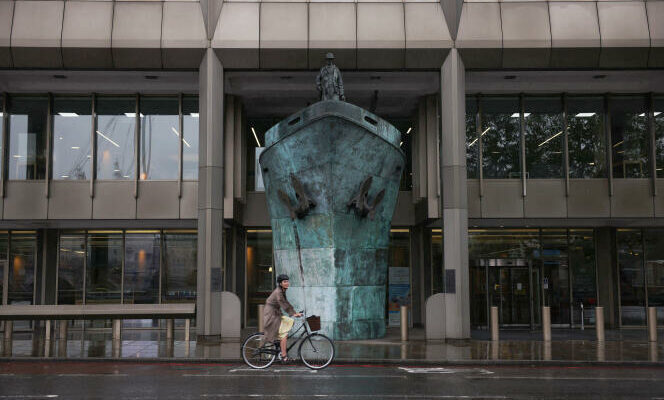A United Nations (UN) flag flies over London, right on the banks of the River Thames. The austere building on which it is located, a stone’s throw from the Palace of Westminster, houses one of the most discreet agencies of the global institution. For a long time, the International Maritime Organization (IMO) was content to harmonize the standards and rules regarding maritime safety, until its role in the fight against global warming forced it to leave the shadow. It is the only one to regulate a sector which is the origin of 3% of global CO emissions.2almost as much as air travel or the entire African continent.
A difficult task, as ships – and shipping companies – reign as masters of the oceans, including at the IMO, where models of container ships, bulk carriers and even chemical tankers, ever larger and more powerful, clutter the hall. ‘entrance.
Ships follow the laws of the sea more readily than those of nations. The most globalized shipping companies on the planet escape the global minimum tax and pay no tax on their profits, only on the tonnage of their ships, which allows them to make significant savings. And, above all, the sector does not appear anywhere in the 2015 Paris agreement on climate change, and its emissions therefore do not appear in any national accounts.
Thus, 98.9% of the giants of the seas pollute, far from view and media attention, by using fuel oil which is one of the dirtiest fuels in the world, the heaviest and most viscous residue of oil. refined, barely thicker than the asphalt used for roads. If nothing is done, maritime transport could produce 17% of carbon emissions in the world by 2050. But any new regulation could slow down the development of entire nations, because maritime transport is also an essential cog in the world. globalization, with its 100,000 freight ships which transport 90% of the planet’s goods.
Economic incentives
IMO if I’m an expert in anything, it’s setting goals. After committing in 2018 to reduce emissions from the sector by half by 2050, the 175 member states of the organization raised their ambitions in July 2023. They promised to achieve carbon neutrality around 2050 while specifying that this goal would depend on “different national circumstances”. Above all, they set themselves the task of… meeting their objectives, by detailing, by 2025, an action plan to reduce emissions, the most delicate challenge. “First there are the technical solutionsdetails the Panamanian Arsenio Dominguez, secretary general of the IMO. We want, for example, new standards on fuels to reduce their greenhouse gas emissions. »
You have 75% of this article left to read. The rest is reserved for subscribers.
